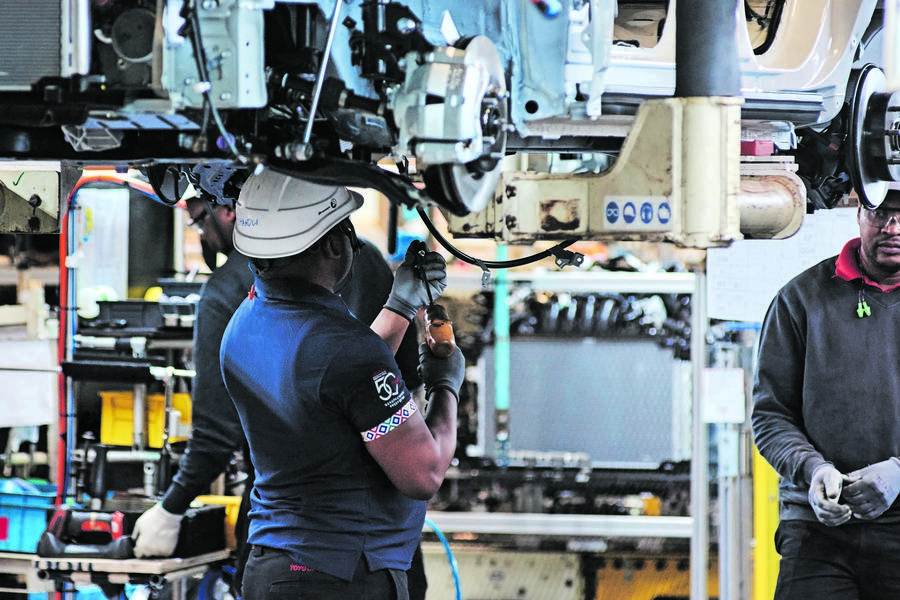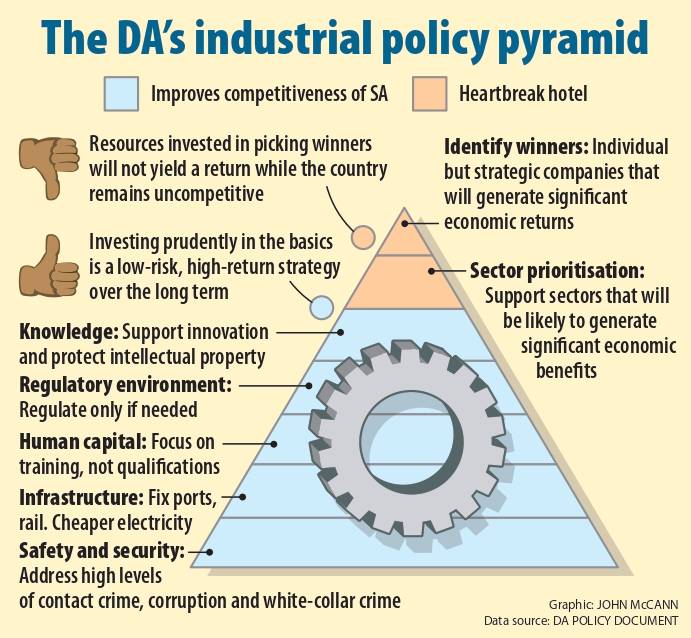
Subsidies’ value: Workers on the assembly line at Toyota’s manufacturing plant in Durban. The vehicle sector employs 120 000 people and contributes 6.4% to GDP. Photo: Waldo Swiegers/Getty Images
Political analysis in the “serious” spaces outside of the sometimes very crude social media frenzy tend to assume that the threat to the economy only comes from predatory forms of authoritarian nationalism, but the threats to the economy also come from the liberal right.
There has been little discussion of the Democratic Alliance’s (DA) far-right economic policy proposals. Its latest economic policy document, titled The DA’s Plan to Unleash Enterprise, Grow the Economy and Create Jobs, offers often tried and globally failed “solutions” to our economic crisis that are a direct attack on the working class.
These proposals show that the DA is not a middle-of-road centrist project and that it takes a hard-right position on economics.
The party’s economic policy proposals offer no real innovation and read as a cut-and-paste job from the free market fundamentalists.
The DA’s plan is full of the buzzwords and trite phrases such as “launching a start-up nation” that one expects from organisations like the Free Market Foundation.
There is no engagement with the work of organisations such as the Institute for Economic Justice, or with progressive economists like Duma Gqubule, Busi Sibeko and many others, let alone studying the work done in countries such as Brazil and Bolivia where millions of people have been brought out of poverty by progressive governments.
The basic aim of the DA’s economic policy proposals is to remove subsidies to big industries such as vehicle manufacturing and replace them with what they term “small start-ups” where, in high Thatcherite fashion, “every citizen is an entrepreneur”.
With slogans like “Creating Growth, Not Oligopolies”, “Enhancing South Africa’s Global Competitiveness” and “Being Pro-Market, Not Pro-Business” they openly aim to destroy the remaining industrial capacity of the country in the name of allowing space for the emergence of small businesses.
Doing away with the subsidies that protect what is left of our industrial base would wreak devastation on whole cities and communities and do away with the unionised jobs that sustain many working-class families.
Free market fundamentalism has failed everywhere it has been tried. The experiences of the United States since Reagan, and the United Kingdom since Thatcher, are the best-known examples in the English-speaking world, but there are many others including, of course, Chile after the US-backed coup against the democratically elected government of Salvador Allende in 1973. In societies where free market fundamentalists have hacked at the state and state support for industry the same set of problems have emerged.
Privatised services such as transport and water provision have inevitably placed private profit before the public good at the direct expense of society, hitting poor and working-class families the hardest. At the same time inequality has soared as the rich get super rich and the rest of society faces increasing immiseration and precarity.
In many countries, including the US and the UK, escalating inequality and collapsing living standards for the majority have sown the dragon’s teeth of right-wing populism.
Research over the past 50 years has convincingly demonstrated that the mantra that a rising tide of small business and a shift towards people understanding themselves as individual entrepreneurs have not reaped the benefits that were touted in the 1970s.
In the US there is substantial evidence that the start-up model has not been a panacea for job creation.
In The Illusions of Entrepreneurship Scott Shane notes that only 1% of people in the US work in companies under two years old, while 60% are employed in firms over 10 years old. Most small businesses shed jobs after their first year, with more jobs lost to bankruptcy in subsequent years than gained by surviving firms.
The DA does not just intend to foster small business at the cost of everything else. It is also proposing the removal of subsidies for state-owned enterprises (SOEs), especially those for electricity, and to remove all import duties in the motor sector.
This destruction of the SOEs, as flawed as they are, will certainly destroy the remaining industrial capacity in our country and can only be viewed as an all-out attack on the working class in a context where mass unemployment is already at extreme levels.
 (Graphic: John McCann/M&G)
(Graphic: John McCann/M&G)In particular, the removal of subsidies from the vehicle sector will mean the end of that industry in South Africa.
The total destruction of the once vibrant automotive manufacturing capacity in Australia is an ominous warning of what would happen here if the DA’s economic policies were adopted. Astonishingly the DA declares that it cannot see any benefit of the vehicle sector to our country’s economy, stating: “It is not clear that these industries produce benefits to South Africa.”
Perhaps the DA needs to be reminded that the vehicle sector contributes 6.4% to national GDP, provides stable employment with benefits for more than 120 000 workers and that the sector accounts for 14.3% of the country’s exports and 24% of manufacturing output. In a country with stagnant economic growth and an unemployment rate that is close to 40%, the contribution of this sector is hugely important.
The DA’s proposal that the vehicle industry be deliberately destroyed and that the people whose lives are devastated by this should take up informal, insecure and non-unionised jobs in start-ups is simply staggering.
The DA’s flag-burning fiasco was deeply offensive to many South Africans. The deliberate sacrifice of 120 000 unionised jobs in the name of market fundamentalism would be far more outrageous. The fact that such an act of wanton destruction is even proposed shows a deep contempt for the working class, a contempt that is clearly racialised.
To compound matters the DA has adopted what they term the “XA Trade Advisors’ policy pyramid”, which appears to come from a consulting company that specialises in outdated, failed neoliberal policies and discourses.
This pyramid makes it clear that in the DA’s future manufacturing has been completely removed as a contributing factor to our economy and as a solution to employment.
Instead of unionised jobs in manufacturing, the DA aims to centre the bulk of jobs in safety and security services.
This is not a model to aggressively grow the economy but rather to create a sort of police state, with impoverished people working to ensure the safety of the rich.
The DA is not alone in taking such a hard-right position on economics, which it matches with a right-wing position on international affairs.
The collapse in the public standing of the ANC has emboldened many of the leading figures and organisations in the white-dominated liberal ecosystem to take increasingly extreme positions and to do so with growing arrogance and an increasingly offensive sense of moral superiority.
South Africa desperately needs an economic policy that defends the good jobs that we have, that fixes rather than nixes the SOEs, and takes every possible measure to create more decent jobs, lift as many people as possible out of poverty, and do everything possible to provide more support for precariously employed workers.
Twenty million people were lifted out of poverty in Brazil from 2003 to 2010 under the Workers’ Party, headed by Lula da Silva. In Bolivia the poverty rate halved under the Movement for Socialism headed by Evo Morales. These are the kinds of examples we should be looking at as we try to resolve our terrible economic crisis, an economic crisis that has pulverised the hopes of millions of people.
A return to the failed market fundamentalism first pioneered in Chile and then taken up by Reagan and Thatcher can only make the rich richer and the poor poorer. The problems with the DA go much further than federal chairperson Helen Zille’s escalating paranoia, party leader John Steenhuisen’s utter mediocrity, and the inability of the party to retain black talent.
The DA is, along with other parties, sharing the same sort of far-right-wing market fundamentalism such as ActionSA, is a direct threat to the working class and impoverished majority.
Dr Vashna Jagarnath is a historian, labour activist and educator.
 (1).png)
 7 months ago
52
7 months ago
52


















